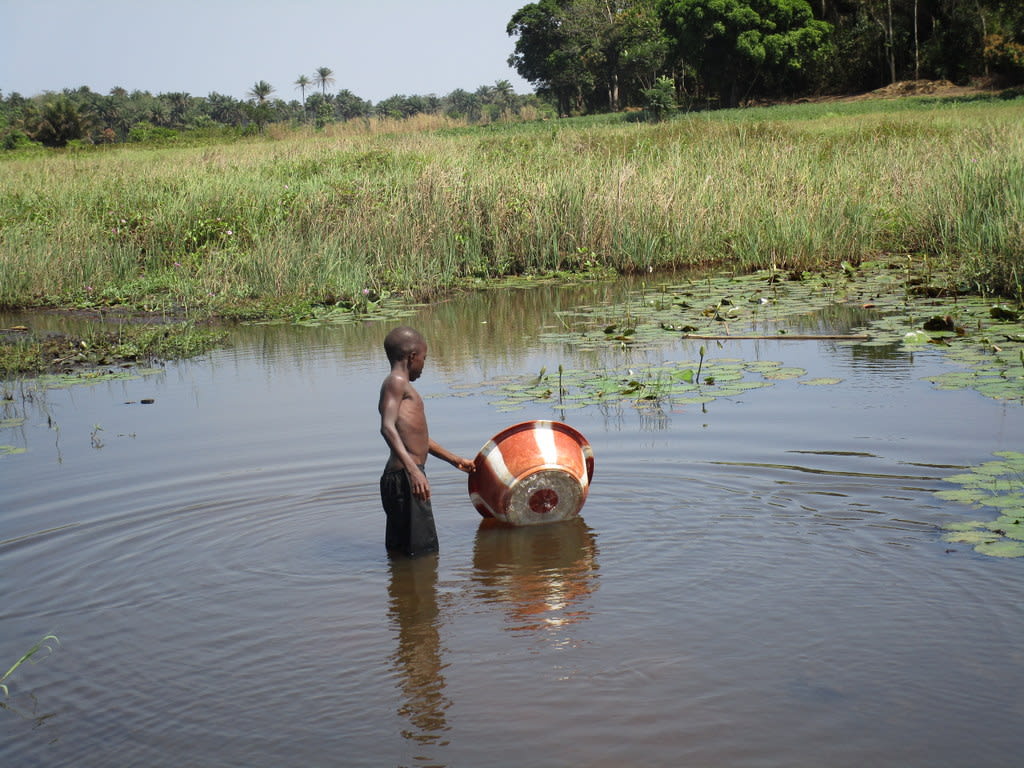Note: Due to scheduling changes, we have moved your donation from the project at 10 Kallie Lane to this one. The project at Kallie Lane will still happen, but we do not expect construction to begin until early fall. As it turned out, this project in the same part of Sierra Leone is already underway.
The protected well that is presently in Tonkoya Village was constructed in year 2000. Four years later, the pump head was stolen and a new pump was eventually installed. But quarterly monitoring of it revealed that it runs completely dry from the start of March to early July.
As a result, people turn to the nearby swamp to meet their water needs.

The water from the swamp gets no treatment of any kind. The water is used as it comes. The water quality at the swamp drops the more it gets close to the dry season. It is murky white and smells of clay and dirt. The time of year when the people thirst for clean water is fast approaching; people with an upper hand can now buy large containers and start storing water in drums for the long drought that is about to befall them.
Exposure to waterborne illnesses, fevers, and dysentery is a grave threat to the community. The people travel far distances with dangerous conditions to fetch water even though it is of poor quality.
We also learned that the cement around the nearby well is not maintained by the community and is currently in need of repair. A poorly maintained well pad allows contaminants to infect the well water and make it unsafe for drinking.
The uniqueness of this community is what binds them together. Each member of the community is related in one way or another. They are all descendants from the same people, the tribe called Bullomites - a tribe that is slowly disappearing.
The most common livelihood in this village is primarily planting of different fruits and vegetables. The village is surrounded by swamps so everything that is planted has a great potential of bearing to the fullest.
Here’s what we’re going to do about it:
Well Rehabilitation
The well marked for this overhaul is dry for a few months every year and needs major work to supply adequate, clean water to the community year round. The pump will be removed, and a hand auger will be lowered inside and powered by a drill team. This hand auger will allow the team to drill several meters deeper to hit a sufficient water column that will ensure the well supplies water throughout all seasons.
As the team drills, casing will be installed, transforming the bottom of this hand-dug well into a borehole. PVC piping will connect this lower system directly to the pump, a construction that we know will also improve the quality of water.
Once this plan is implemented, everyone within the community will have access to safe drinking water in both quality and quantity, even through the dry months.
Hygiene and Sanitation Training
There will be hygiene and sanitation training sessions offered for three days in a row.
"The hygiene and sanitation in this community has been steadily improving even though we have a long ways to go," said Mammy Kamara.
After our visit, the hygiene and sanitation trainer decided it would be best to teach community members how to build a tippy tap (a hand-washing station built with a jerrycan, string, and sticks). They will use these tippy taps for handwashing demonstrations, and will also teach about other tools like dish racks and the importance of properly penning in animals.
These trainings will also strengthen the water user committee that manages and maintains this well. They enforce proper behavior and report to us whenever they need our help solving a serious problem, like a pump breakdown.

 Borehole Well and Hand Pump
Borehole Well and Hand Pump





































